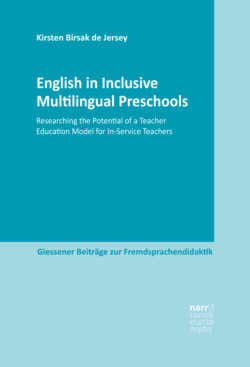Читать книгу English in Inclusive Multilingual Preschools - Kirsten Birsak de Jersey - Страница 16
На сайте Литреса книга снята с продажи.
3.2.3 State preschools offering English as a foreign language
ОглавлениеThe second part of the question aimed at finding out whether the state preschools offered English (→ question 2b). There were three options to choose from: either English would be offered on a regular basis; it would be offered only occasionally (for example, singing an English song or chanting a rhyme every now and again) or English would not be offered at all (→ question 2b). From my knowledge of the context, preschools have two options: either the employed staff (preschool teachers or the head of the preschool) would be responsible to integrate English in their routine or a visiting teacher would offer it. A visiting teacher is a teacher who comes to the preschool to offer English on a regular basis as an extra-curricular activity. Visiting teachers are either qualified English teachers or native speakers of English. It was important to find out how many of the preschools offer English regularly through the regular staff that is employed at the preschool in question, the preschool teachers or the head of the preschool. Again, this would provide important information on teachers’ English teaching competences. It would also be interesting to learn if English were offered to all of the children of a preschool or only to a selected group of children. Data that provided this information resulted from the following questions:
Is English offered in your preschool? (Wird Englisch in Ihrem Kindergarten angeboten?) (question 2b).
Who offers it? (Wer bietet es an?) (question 2b-1).
When offered by a visiting teacher, which children take part? (Wenn angeboten von jemandem von auswärts: welche Kinder nehmen am Unterricht Teil?) (question 2b-2).
The data shows that over half of the state preschools offer some form of English either as a regular activity (answered with yes) or only occasionally (meaning they only sang a song every now and again). 10 preschools offered English on a regular basis (→ statistical data 7). Of these 10 preschools, only 2 offered English through their preschool teachers (→ statistical data 8). The remaining 8 preschools offered English through visiting teachers (→ statistical data 9). All of the visiting teachers taught small groups of enrolled children. Therefore, it can be concluded that the general situation in state preschools in Salzburg is that the majority of the preschools either offer no English at all or provide it only as an extra activity to an exclusive group of children.
Figure 8:
Statistical data 7: English offered in Salzburg state preschools
Figure 9:
Statistical data 8: Preschool teachers offering English regularly to their groups
Figure 10:
Statistical data 9: Visiting teachers offering English regularly
As there were only 2 state preschools offering English as a regular component by the preschool teacher, the teacher education project could not expect to build on any routines preschool teachers might have developed. Teaching English to all of the children would therefore be an entirely new experience for participating teachers.
The questionnaire survey that aimed to identify the contextual framework that preschool teachers work in resulted in the following representative state preschool profile: it comprises three groups of children, ranging in size from 19 to 25 children with all three groups being multilingual. The preschool offers extra support to the children to learn German. This is usually done by the head of the preschool who teaches small groups of four children on a daily basis for which the children are taken out of free play. Additionally, a German language teacher visits the preschool a few times a week. English is not offered as a regular curricular component by the preschool.
For my teacher education project this meant that I would have to identify a preschool that represents this contextual framework (→ chapter 6.2, sampling). It would also mean that I could not build on any routines and competences of participating preschool teachers in the area of language teaching. A further factor that would need to be considered before setting up the teacher education project would be their attitudes towards introducing English in the preschool. If they were reluctant to introduce it, they would definitely not be prepared to be qualified for teaching it. Questionnaire results that relate to this aspect are presented in the following two chapters.
